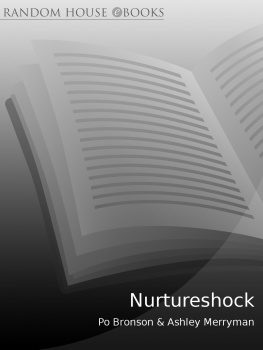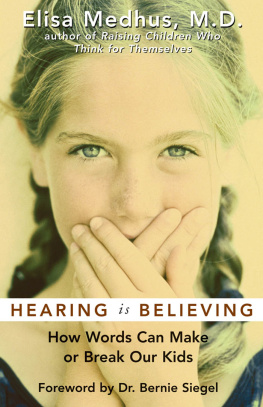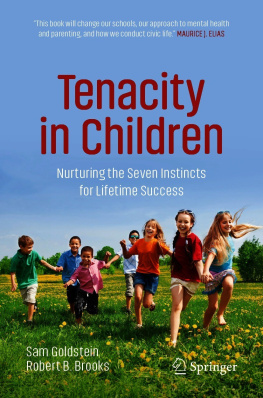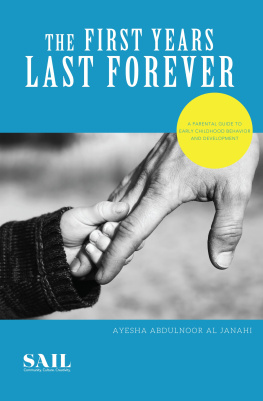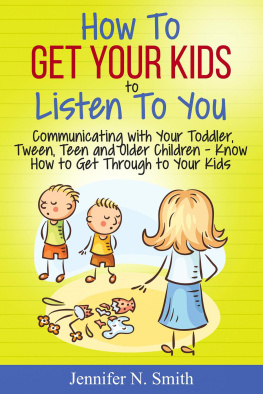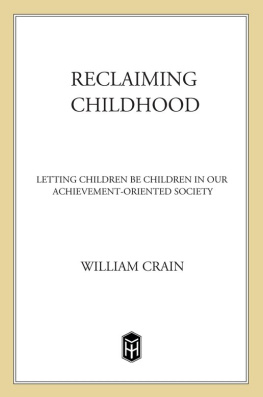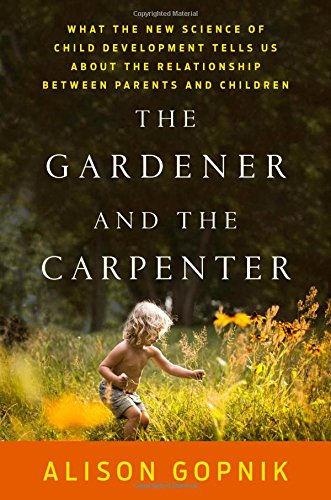NURTURESHOCKPo Bronson & Ashley Merryman
This eBook is copyright material and must not be copied, reproduced, transferred, distributed, leased, licensed or publicly performed or used in any way except as specifically permitted in writing by the publishers, as allowed under the terms and conditions under which it was purchased or as strictly permitted by applicable copyright law. Any unauthorised distribution or use of this text may be a direct infringement of the authors and publishers rights and those responsible may be liable in law accordingly.
Epub ISBN: 9781407079080
Version 1.0
www.randomhouse.co.uk
1 3 5 7 9 10 8 6 4 2
Published in 2009 by Ebury Press, an imprint of Ebury Publishing
A Random House Group Company
Copyright Po Bronson 2009
Po Bronson has asserted his right to be identified as the author of this Work in
accordance with the Copyright, Designs and Patents Act 1988
All rights reserved. No part of this publication may be reproduced,
stored in a retrieval system, or transmitted in any form or by any means,
electronic, mechanical, photocopying, recording or otherwise,
without the prior permission of the copyright owner
The Random House Group Limited Reg. No. 954009
Addresses for companies within the Random House Group can be found at
www.randomhouse.co.uk
A CIP catalogue record for this book is available from the British Library
The Random House Group Limited supports The Forest Stewardship Council (FSC), the leading international forest certification organisation. All our titles that are printed on Greenpeace approved FSC certified paper carry the FSC logo. Our paper procurement policy can be found at www.rbooks.co.uk/environment
Printed in the UK by CPI Mackays, Chatham, ME5 8TD
ISBN 9780091933777
To buy books by your favourite authors and register for offers visit www.rbooks.co.uk"
ALSO BY PO BRONSON
Why Do I Love These People?
What Should I Do With My Life?
The Nudist on the Late Shift
The First $20 Million Is Always the Hardest
Bombardiers
introduction
Why our instincts about children can be so off the mark.
M y wife has great taste in art, with one exception. In the guest bedroom of our house hangs an acrylic still lifea pot of red geraniums beside an ocher-toned watering can, with a brown picket fence in the background. Its ugly, but thats not its worst sin. My real problem is that its from a paint-by-numbers kit.
Every time I look at it, I want to sneak it out of the house and dump it in the corner trash can.
My wife wont let me, though, because it was painted way back in 1961 by her great-grandmother. I am all for hanging on to things for sentimental reasons, and our house is full of her familys artifacts, but I just dont think this painting contains or conveys any genuine sentiment. There was probably a hint of it the day her great-grandmother bought the paint-by-numbers kit at the crafts storea glimmer of a more creative, inspired lifebut the finished product, in my opinion, kind of insults that hope. Rather than commemorating her memory, it diminishes it.
Painting by numbers skyrocketed to success in the early 1950s. It was hugely popularthe iPod of its time. It was marketed on the premise that homemakers were going to have a vast surplus of free time thanks to dishwashers, vacuum cleaners, and washing machines. In three years, the Palmer Paint Company sold over twelve million kits. As popular as the phenomenon was, it was also always surrounded by controversy. Critics were torn between the democratic ideal of letting everyone express themselves and the robotic, conformist way that expression was actually being manifested.
The other day, I was trying to remember how I felt about the science of child development before Ashley Merryman and I began this book, several years agowhen all of a sudden that painting of potted geraniums popped into my head. I had to go home and stare at that ugly painting for an evening before I could figure out why. Which I ultimately realized was this:
The mix of feelings engendered by paint-by-numbers is similar to the mix of feelings engendered by books about the science of children. This is because the science has always carried with it the connotation that parenting should be by the book. If the science says X, youre supposed to do X, just like paint-by-numbers instructed hobbyists to use Cornsilk and Burnt Umber for the handle of the watering can.
So if a few years ago, someone had told me, You really ought to read this book about the new science of kids, I would have politely thanked him and then completely ignored his recommendation.
Like most parents, my wife and I bought a few baby books when our son was born. After the first year, we put them away, until three years later, when our daughter was born and the books once again graced our shelves. Until our daughter turned oneafter that, we no longer had any interest in the books.
Most of our friends felt the same way. We agreed that we didnt parent by the book, nor did we want to. We parented on instinct. We were madly in love with our children, and we were careful observers of their needs and development. That seemed enough.
At that same time, Ashley and I had been co-writing columns for Time Magazine. Living in Los Angeles, Ashley had spent years running a small tutoring program for inner-city children. She has been something like a fairy godmother to about 40 kids, a constant presence in their lives from kindergarten through high school. Guided by her instincts, Ashley has had no shortage of ideas about how to steer the kids in her program. She has never lacked inspiration. All she felt she needed was more tutors and some school supplies.
In that sense, neither Ashley nor I were aware of what we were missing. We did not say to ourselves, Wow, I really need to brush up on the science of child development, because Im messing up. Instead, we were going fairly merrily along, until we sort of stumbled into writing this book.
We had been researching the science of motivation in grown-ups, and one day we wondered where kids get their self-confidence from. We began to investigate this new angle. (The story we ultimately wrote ran on the cover of New York Magazine in February of 2007, and its expanded here as Chapter 1 of this book.) What we learned surprised us and was simultaneously disorienting. Prior to that story, our instincts led us to believe, quite firmly, that it was important to tell young children they were smart, in order to buoy their confidence. However, we uncovered a body of science that argued, extremely convincingly, that this habit of telling kids theyre smart was backfiring. It was in fact undermining childrens confidence.
We changed our behavior after researching that story, but we were left with a lingering question: how could our instincts have been so off-base?
According to lore, the maternal instinct is innate. Women are assured it doesnt matter if they spent their twenties avoiding babies, or if they dont consider themselves very maternal. The moment after birth, when the babys first handed to his mother, maternal instincts magically kick in, right along with the hormones. As a mother, you will know what to do, and you will continue to know for the next eighteen years. This fountain of knowledge is supposed to come as part of a matched set of ovaries and a desire to wear expensive high heels.
Thanks to this mythos, we use the word instinct to convey the collective wisdom gleaned intuitively from our experiences raising kids. But this is an overgeneralization of the term. Really, the actual instinctthe biological drive that kicks inis the fierce impulse to nurture and protect ones child. Neuroscientists have even located the exact neural network in the brain where this impulse fires. Expecting parents can rely on this impulse kicking inbut as for how
Next page
